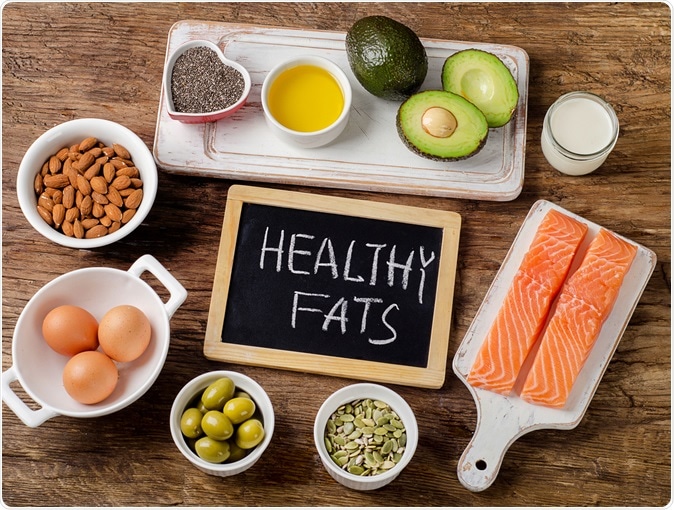Most public health guidelines including the Dietary Guidelines for Americans do not allow fat portions in excess. However nutritionists and dieticians have now agreed that not all fats in diet are bad and many of them could be allowed.
At present there is ample evidence to show that not all forms of fats are bad for the heart and some are indeed good for the heart. Some of the fats may help to reduce triglycerides in blood. This is a particularly harmful type of lipid particle in blood that causes heart disease. Some fats can also raise the HDL or “good” cholesterol in the blood and thus protect the heart. As the HDL rises, the levels of the harmful LDL cholesterol start to decline.

Image Credit: Bitt24 / Shutterstock
The new evidence shows that fat content in diets can not only improve the satisfaction with the diet but also help in reducing weight and preserving muscle mass. Some fats such as the trans fat is bad for the heart and should be avoided say experts. However all fat molecules are broken down in the body to provide high amounts of energy. Each gram of fat yields 9 calories. Fats are broken down into simple molecules containing hydrogen and carbon atoms. There are two major types of fats – saturated and unsaturated. Unsaturated fats contain carbon molecules binding to other carbon molecules while saturated fats contain carbon molecules binding to hydrogen molecules.
There are mono and poly unsaturated fats or fatty acids (MUFA and PUFA). MUFA have a single unsaturated carbon bond and are seen in good fats such as olive oil, some types of nuts etc. PUFA contain more than one unsaturated carbon molecule and are found in plant or vegetable oils, salmon and sardines, walnuts etc. Some of the saturated fats include “12-carbon lauric acid, 14-carbon myristic acid, 16-carbon palmitic acid and 18-carbon stearic acid”. Among these stearic acid is not responsible for raising bad cholesterol LDL in the body.
These findings have indicated that not all fat consumed is same and neither are their effects on the body. Researchers have said that dietary fat needs to be lowered since the 1930’s with the Nutrition Committee of the American Heart Association in 1968 recommending reducing the total saturated fat intake. The first Dietary Guidelines for Americans by the Senate Select Committee on Nutrition and Human Needs was published in the 1977 and it emphasized on the same principle.
Researchers led by Heidi Silver, an associate professor of medicine at Vanderbilt University, developed a diet plan for 14 days. The menus contained three meals and two snacks in a day. The diet plan raises the total intake of “18-carbon monounsaturated fat, oleic acid and the 18-carbon and longer chain polyunsaturated fats”. These longer chain PUFA are also called the omega-3 and omega-6 fatty acids. They replaced the carbohydrate snacks with nuts and croutons in the salads were replaced by slices of avocado. Salad dressings were made of canola oil, safflower oil and olive oil. This diet was advised to 144 women over a period of 16 weeks. This diet showed a significant reduction in abdominal fat and waist circumference in these women and there was also a 6 percent improvement in blood pressure markers. The five and 10 year heart disease risk was also reduced by 6 percent among these women. The diet was appreciated and satisfactory for the participants.
The researchers then looked at the blood lipid profiles of the participants. They noted that the balanced moderately high fat diet showed more improvements in levels of triglycerides and LDL cholesterol among Caucasian females and significant rise in HDL levels among African-American females. Authors concluded that not all populations respond similarly to diets and diets need to be individualized for benefits.
This study was funded by the Atkins Foundation.